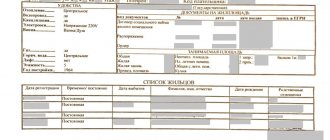Is it possible to register real estate for a minor child?
Is it possible to register a house for a minor child in Russia? Is it possible to register a dacha for a minor child? The laws clearly state that any person has the right to own property regardless of age.
Based on this, we can come to the conclusion that children enjoy the right of private ownership of real estate on an equal basis with their parents.
But there is a certain procedure for concluding special transactions under which ownership of such property is transferred. Transactions are drawn up in writing (purchase and sale, donation), and are signed by the parties who have full or special legal capacity.
Every citizen, including minors, has the right to own real estate
But after signing the deal, the agreement itself must undergo special registration with government agencies (Rosreestr). And only after this the child will become the full owner of the home.
In our case, parents, guardians and adoptive parents of children have full legal capacity, and special children aged 14 to 18 years.
Until the child reaches the age of 14, his parents manage his property
It follows from this that if the child is under 14 years old, then the right to sign the agreement (purchase and sale, gift), according to which he will become the owner of the home, belongs to the parents (guardians, adoptive parents).
And if he is older, then with the consent of the mother and father (guardians, adoptive parents), such a child independently puts his signature on all contracts and signs documents for registering real estate.
Thus, to the question: is it possible to register real estate for a child, we can confidently answer that any child can take ownership of real estate, without any legal restrictions, and have full rights to use it at their own discretion.
It is important to know that the rights of the child are monitored by the guardianship and trusteeship authorities.
Therefore, if real estate is acquired by a child as a result of the sale of an old apartment or house where the latter was registered, then such a transaction requires the mandatory consent of the guardianship authority.
Inheriting an apartment
The right to inheritance arises in two cases:
- as a result of inheritance according to the order determined by law (Chapter 63 of the Civil Code of the Russian Federation);
- by will.
For a will to be valid, the document must be certified by a notary. However, in extreme cases, when this is impossible for objective reasons, the law allows certification by third parties:
- the head of the institution where the testator is located - the head physician, director of a nursing home, etc.;
- commander of a military unit;
- two disinterested witnesses.
It is worth considering that the law not only ensures a person’s right to transfer his apartment after death to a chosen person, but also protects the interests of disabled and minor heirs. Therefore, even if a person bequeaths an entire apartment, but after his death there will be a disabled spouse, a minor child or another dependent heir, they will receive at least half of the share that would have passed to them in the event of inheritance by law (Article 1149 of the Civil Code of the Russian Federation).
For example, the testator left an apartment to his adult daughter, but he also has a minor son. If, in the absence of a will, the son could claim half of the apartment, then after the will is executed he is entitled to a ¼ share. Moreover, in the opposite situation, when a will is drawn up in favor of a minor, infringing on the rights of other capable heirs, they will no longer be able to count on their share of the inheritance.
To refuse an inheritance, the decision of the child’s representatives alone is not enough. As in any case concerning real estate owned by minors, consent to this must be given by the guardianship authorities. As in the case of a donation, it is extremely difficult to obtain it, since it will be necessary to prove that receiving an apartment will harm the interests of the child.
If the will is made in favor of a child who is about to be born, ownership passes to him after birth.
Since a minor does not have the right to dispose of an apartment, when drawing up a will, a person can appoint trustees who guarantee the execution of the will. Often such concern for the interests of the child is unnecessary, since after the minor takes ownership rights, the legality of real estate transactions will be monitored by the guardianship authorities. Therefore, the situation when a minor heir loses the apartment left by the testator due to dishonesty or malicious intent is minimized.
How can real estate be transferred to a child?
There are several ways to transfer real estate to a child; you will need to choose the one that is most convenient for you.
Having figured out that registering real estate for a child is not difficult, now you need to move on to how this can be done.
In our legal field, there are many ways to acquire such property.
But in this situation, it is best to opt for methods that do not entail certain legal consequences.
To purchase square meters for your baby, it is better to use the following methods:
- Through privatization. This action means the purchase from the state or municipality of housing that belongs to them by right of ownership.
- Through a deed of gift, when real estate is donated to one’s relatives.
- Through inheritance, that is, parents or other relatives write a special will stating that after their death, the children become their heirs and take ownership of the home.
- By buying and selling. This is the most common deal.
- Each method has its advantages in specific situations, so this needs to be considered in more detail.
It is important to know that in the above cases, the child is given a real estate document, which, after its registration, confirms the child’s ownership of the residential premises.
How can I apply?
So is it possible to register an apartment for a minor child and how to do it? Such transactions are completely legal, so there is no need to look for workarounds. Registration of real estate for a child is possible in several ways:
- By completing a standard purchase and sale transaction.
- Through privatization for a minor child - a share or the entire apartment.
- By drawing up a gift agreement.
- According to the will, but this cannot be called a full transfer of the object for the use of a minor.
The process of registering real estate for a child is considered separately if the property is under mortgage.
Please note that if an apartment is purchased using maternity capital, the child will in any case be the owner - the entire property or part.
Privatization
The simplest option is the child’s participation in the privatization of the apartment
Despite the fact that this method of acquiring real estate residential property is considered outdated, according to statistics, there are still many apartments in our state that are owned by the municipality and are rented out to the persons living in them under a rental agreement.
In order for housing to become property, it must be privatized, that is, a special legislative procedure must be completed. According to the general rules, such housing is privatized for all family members, including children in equal shares.
Therefore, the child or children automatically become the owners of part of the premises.
In order for all square meters to become the property of the child, it is enough for the parents, during the privatization process, to write special statements that they renounce their shares in favor of the child, and he actually becomes the full owner of the apartment.
House or apartment
In Art. 574 of the Civil Code of the Russian Federation specifies two forms of DD – oral and written. A deed of gift on paper is required if it contains a clause promising a gift in the future or if real estate is transferred as a gift. Also, the DD is drawn up in writing if the donor is an organization and the value of the gift exceeds 3,000 rubles.
Land plot
A gift agreement for a minor is drawn up in accordance with the rules provided for in Chapter. 32, art. 21, art. 26 of the Civil Code of the Russian Federation, as well as some provisions of the Family Code. To give a child a valuable item, you will need the consent of the parents, as well as compliance with a number of legal norms. Let's look at how donations to minors are made, who has the right to act as a donor, when a child signs the deed of gift independently, how to formalize everything correctly and whether taxes need to be paid.
Until the child reaches 14 years of age, all transactions with real estate owned by him, including the payment of duties and taxes, will be carried out by his parents or legal guardians; from 14 to 18 years of age, the child, with the permission and written consent of his parents, can independently manage real estate. In order to register land for a child, you will need the following documents:
Donation
The transfer of ownership from one owner to another can occur through a deed of gift.
To do this, the owner of an apartment or house comes to the notary and expresses a desire to give such an object to the child.
The notary, in turn, draws up a special form, makes a note in the notarial records, and issues a document stating that the residential property has a new owner.
You can transfer an apartment to a child by registering a deed of gift with a notary
At the same time, you must not forget that the new owner (child) must agree to accept the property as a gift (if he is 14 years old), or his parents should do this (if the child is under 14 years old).
Unlike privatization, such an agreement must be registered with Rosreestr, and only from this moment the transaction will be considered valid.
The advantage of a deed of gift is that you do not need to pay taxes, and after some time the child, if the need arises, can give the apartment or house to another relative, but this will happen under the control of the guardianship authority.
At the transaction itself, the presence of representatives of the guardianship council is not necessary, since it does not provide for a comparison of housing conditions that existed in the past and will arise in the present.
It is important to know that a deed of gift is difficult to revoke by a court decision. This transaction is ideal for transferring real estate between relatives.
What do guardianship authorities take into account when assessing alternative real estate?
The location of the new apartment is taken into account: the sale of an apartment in Moscow may not be approved if the new property is located in the regions.
The cost of housing is also taken into account: if the price of the new apartment is less than that of the minor’s, parents may be required to transfer the difference to the child’s bank account, which he will have access to upon reaching 18 years of age.
In addition, parents (or guardians or adoptive parents) and their close relatives do not have the right to buy real estate that belongs to the child.
Will
Drawing up a will for a child will ensure the transfer of real estate into his property and protect him from attacks by other relatives
The process of transferring real estate under inheritance law has several features. It can occur by will or law.
In the second case, the square meters are divided equally between all heirs, despite the fact that a child is claiming the share.
Therefore, in order to provide square meters for their children, it is better for parents to resort to drawing up a will. It will act as a guarantee that other heirs will not lay claim to the real estate.
In addition, any will can be canceled and a new one drawn up, so the child will be more disciplined.
The will is drawn up in a notary's office. If something happens, the person who compiled it may change his decision.
This method is good in cases where there is a suspicion of dishonest relatives who may demand their share when entering into an inheritance by law.
Inheritance
Inheritance is the procedure for transferring property into ownership from the deceased to the heirs; the age of the heirs also does not matter.
The law allows two ways to obtain an inheritance:
- According to the law, in order of priority.
- By receiving under a will.
The law provides that relatives of the deceased can receive property owned by the deceased, but only in accordance with the degree of relationship. This procedure includes compliance with the order of receiving an inheritance provided for by the Civil Code of the Russian Federation, Chapter 63. There are 8 stages, the first includes spouses (former ones do not count), children, all of whom are recognized as deceased, and the parents of the testator. After the death of one of the parents, the child can claim a share, and if there are no other heirs in this line, then all the property owned by the deceased.
In addition to receiving inherited property in order of priority, property can be transferred into the possession of a minor by bequeathing it to him. In this case, any person can act as a testator, regardless of family ties with the child.
To register inheritance you must:
- Prepare a package of papers;
- Contact the notary office at the place of registration of the testator to open an inheritance case;
- After the time established for registration of inheritance has expired, register the property rights of the new owner.
When registering an inheritance for a minor recipient, all actions must be performed in the presence of his legal representatives.
When contacting the notary office at the place where the estate is registered, you must provide the following documents:
- document for the heir's child. Passport if he is 14 or less, documentary evidence of his birth;
- the child's representatives will be required to provide documentary evidence of the right to represent his interests;
- document on the death of the testator;
- all papers for inherited property;
- inheritance valuation;
- it is also necessary to pay the prescribed state fee, the amount is calculated taking into account the value of the inheritance.
After registration of real estate, the child also has the right to dispose of it upon reaching adulthood.
Buying an apartment for a child
Can a minor child buy an apartment? The process of acquiring an apartment through purchase and sale is currently the most common.
This is due to the fact that the best way to invest money is real estate, since until the baby grows up an apartment or house, you can rent it out and make a profit.
Such an agreement is drawn up in a notary's office and requires the signatures of all parties. It must be said right away that the buyer signs the person. If he is 14 years old, and if his parents or other legal representatives are not.
After drawing up the agreement, it must be registered not only with a notary, but also in the state register. They do this because only from the moment of registration of a document for real estate does ownership begin.
After the entire procedure, the minor becomes the full owner of the real estate.
It is important to know that if the purchase of an apartment or house takes place with money from previously sold property where a minor was registered, then it is necessary to obtain the mandatory consent of the guardianship and trusteeship authority to carry out such a transaction.
How can this be done
In order to transfer property to a minor child, you can use several methods:
- draw up a gift agreement;
- buying and selling;
- carry out privatization;
- write a will for the child.
The methods of transferring ownership of real estate are absolutely the same for both children and adults.
The property being registered can be:
- apartment or part thereof;
- a house or a share in a house can be registered;
- as well as land.
Each procedure will be accompanied by a number of specific actions and the collection of necessary papers. And also in some cases, consent from the guardianship authorities will be required to carry out certain transactions: if the child wishes to renounce the inheritance share, when making a donation, etc.
Pros and cons of a child becoming an owner
Decorating an apartment for a child has its pros and cons
Purchasing real estate for a child has the following advantages:
- first, he becomes the owner of the property, and after reaching the age of majority he can dispose of it at his own discretion;
- Until the child reaches adulthood, an apartment or house can be rented out and the money received can be spent on the needs of the family or the child;
- the property of a minor cannot be seized or otherwise seized for monetary or other obligations of the parents;
- Guardianship and trusteeship authorities strictly monitor the rights of children. Therefore, various transactions with such property that have signs of fraud will be necessarily canceled by the court, and the children’s rights will be restored.
If we talk about minuses, then there is only one. It is almost impossible to sell the baby’s property, as the guardianship authorities will oppose it.
They will only give permission to improve the latter’s living conditions. It should also be said that after the age of 14, a minor can limit the actions of his parents in managing his property. There are no more cons.
Speaking about whether it is possible to register real estate for a child, it must be said that this procedure is the same for children and adults.
The law does not establish any restrictions, with the exception of the presence of parents in transactions where the minor is under 14 years old, that is, all agreements are signed by guardians.
Upon reaching 14 years of age, parents only give written consent, and the child signs.
Learn more about transferring real estate into the ownership of a child in the video:
See also Phone numbers for consultation Oct 11, 2021 Yulia Yuryevna 1242
Share this post
Discussion: 2 comments
- Alexander Maksimov says:
10/11/2019 at 09:11If you register an apartment for a minor child, then, as I understand it, he still will not be able to manage it. This means that everything depends on the location of the guardians. They will be able to sell it without his knowledge.
Answer
- Olga says:
11.11.2019 at 16:36
It is good that the rights of minor children are being significantly expanded in our time. Previously, many such opportunities did not exist, so housing issues were much more difficult to solve.
Answer
Reasons for the decision
Parents come to the conclusion that it is necessary to register an apartment for their child for various reasons, some of which cannot be called appropriate. Common situations:
- The apartment is transferred into the ownership of the child in order to ensure his future and be guaranteed to provide living space. The advantage of this choice is the confidence that, regardless of the circumstances, the child will be the owner of his own property.
- The desire to remove a property from the regime of joint ownership of spouses. This is a way to prevent the division of an apartment in the event of a possible divorce, since only common property can be divided.
- The desire to save the apartment. For example, in situations where a large loan is taken out from a bank and there is a fear of foreclosure on the apartment in the future if debt arises.
- Distrust of parents or one of them on the part of grandparents and other relatives who seek to provide for the child.
Despite the advantages and legal tricks, each of these motives gives rise to a significant difficulty - a significant restriction of the right to dispose of property on behalf of a minor. If you intend to sell, exchange or donate an apartment, you will definitely need permission from the guardianship and trusteeship authority, which monitors the interests of the child.
Content:
Hello! As an option, you can first alienate your son’s share in the apartment through an exchange agreement, while improving his living conditions. For example, a husband exchanges 1/3 in his apartment for 1/4 of his son’s share in a shared apartment. This will require the consent of the guardianship and trusteeship authorities. Then you calmly sell the apartment and buy whatever you want.
We recommend reading: Benefits for liquidators of the nuclear power plant accident in Moscow in 2021
Answers from lawyers (7)
A deed of gift is a common and, at first glance, simple and reliable way of transferring ownership of real estate in our country. However, there are nuances that must be taken into account when drawing up a gift agreement - otherwise the agreement may be declared invalid. The Domik.ua portal understood how to correctly draw up a gift agreement and what taxes need to be paid.
- the transaction was concluded in violation of the law;
- violation of the rights of a minor when making a transaction;
- significant deterioration in the material and living conditions of the donor;
- negligence of the new owner towards the donated property, which may lead to its damage or loss in the future;
- the recipient committed a crime against the donor or his family;
- the recipient died before the donor (if the condition is provided for in the contract).
The donor can only be a legally capable land owner. We are talking about plots that are not limited in civil circulation and have not been confiscated. The main condition is the voluntary decision of the donor.
Legislation
A mutual decision by both parties to annul the deal or the voluntary renunciation of the land by the offspring should not be ruled out. At the same time, a corresponding application and agreement on termination of the transaction are also submitted to Rosreestr. If the “small” owner managed to receive the ownership paper, he will have to go to court to terminate the already concluded contract.
- Reducing the cost of paying property tax for individuals if legal representatives (parents, guardians) have real estate of the same type.
- Providing children with their own housing in advance, providing both a solid financial foundation and social independence.
- The impossibility of dividing or allocating part of the housing from the child’s share in the event of divorce between the parents, as well as the inability to dispose of it to unauthorized persons.
- The child is not responsible for the parents’ loan obligations with his property.
- application for registration of rights to real estate with signatures of the parties to the agreement;
- certificate of ownership of the apartment/house;
- a certificate from the Unified State Register of Real Estate Rights (registry of real estate rights) confirming the absence of encumbrances or restrictions on the apartment/house;
- birth certificate;
- technical passport from the BTI and cadastral passport from the local cadastral chamber (FGBU FKP Rosreestr);
- identification documents of the child’s representative;
- passport of a minor if he/she is over 16 years old;
- agreement of gift or sale.
Required documents
- Written permission from both parents, certified by a notary.
- Deed of gift in 2 copies + copy.
- Passports of both parents.
- Child's birth certificate or passport.
- Extract of ownership of the property from the Unified State Register.
- Receipt for payment of state duty.
- An application on behalf of the donor, completed and signed by legal representatives for children under 14 years of age.
- Passport for an apartment or other property from the BTI.
- A certificate of apartment assessment from the BTI, or an assessment by an independent expert organization that is a member of the SRO.
- An extract from the house register listing all persons registered in the apartment, including those who are registered in the apartment or house, but are currently absent from it for a long time (serving in the army, serving a prison sentence, staying abroad, etc.).
- Application on behalf of the child, with consent to accept the gift of this property.
And one more thing: if a child is registered in a residential building on a land plot, but does not appear as a co-owner, the consent of the guardianship authorities for the sale of the property is not required. It is issued from the first address and registered at the second.
Ownership may be granted as a gift or in any other way. Of course, a minor citizen cannot take part in the signing of documents, but his legal representatives, that is, parents or guardians, will do everything instead.
Features and special cases of registering ownership of a land plot: if there are no documents, for a minor
Next, the transfer of ownership of the dacha plot is registered in Rosreestr within 10 working days, after which you, as the child’s legal representative, receive a certificate of state registration of rights to real estate in the name of your child. Thus, your child will become the owner of the land.
- The above-mentioned agreement in the amount of 3 copies.
- Receipt for payment of state duty, the amount of which is 2021 rubles.
- All personal documents and their copies - passport, birth certificate, etc.
- Documents of the donor confirming his right to real estate.
- If the donated property was acquired during marriage (that is, it is jointly acquired), then the consent of the second spouse is required for the transaction.
We recommend reading: Checking a driver's license by number and series
Moreover, the nature of the transaction depends on the age of the recipient . If he is under 14 years old, then his parents take over the property instead. If it is more than 14, then the minor himself receives the gift, and only written consent is required from the parents.
Terms of a transaction
For example, before actually receiving a plot of land, all utilities must be paid by its owner, that is, the donor. The exact date from which full responsibility for the plot will rest with the recipient of the gift is specified in the transfer deed.
Thus, if you are buying a house where the owner (even a share) will be a minor, you need to understand that the transaction is concluded only with the consent of the guardianship and trusteeship authorities and requires notarization. All rules applicable to a purchase and sale agreement also apply to an exchange agreement.
We conclude that registering a house in the name of a child is not difficult, but selling a house registered in the name of a child is much more difficult. For example, the guardianship authorities do not give permission if you are going to take out a mortgage on the new property, since this infringes on the rights of the child, even if the new house will be more spacious and more expensive than the one owned by the minor child.
Donating a house or share of a house to a minor child
When buying and selling a house, it is important to take into account the nuance that if you are going to sell a house registered in the name of a child, then the sale must be agreed upon with the guardianship and trusteeship authorities. Even if you are selling a house where the child's share is very small, such consent is required. Therefore, before selling a house registered in the name of a child, check all the details with the guardianship and trusteeship authorities (at the child’s place of registration). The rights of the child should not be infringed.
- Statement from the donor.
- A statement from a minor over 14 years of age (or from his legal representatives if he is younger than that age) about consent to accept the gift of property.
- 2 original deed of gift, certified by a notary. They must contain all information about the apartment: address, technical characteristics, inventory number. The contract specifies information about documents confirming the identity of the donor and the child being gifted.
- Certificate of ownership of real estate;
- If there are several owners, notarized consent of all owners;
- An extract from the house register (needed to confirm that no one is currently registered in the apartment);
- Personal account statement;
- Certificate from the BTI;
- A copy of the cadastral passport.
According to legal concepts, there are two categories of children:
The most common reason why real estate is registered in the name of a minor child is the desire to provide him with his own housing in advance, which the parents will not be able to divide among themselves during a divorce. In this case, the apartment will not be considered joint property of the spouses. Housing is also registered in the name of a child if it is given to him or passed to him by will.
Extracts from the real estate register, as well as certificates of encumbrances can be ordered at any MFC by presenting a passport and paying a fee. You can also find out hidden encumbrances in the form of third party rights a notary office .
- a copy of the child's birth certificate,
- a copy of the child’s passport (for children over 14 years old),
- a copy of the child’s representative’s passport,
- an extract from the Unified State Register of Real Estate about the current rights to the apartment,
- certificate from Rosreestr confirming the absence of encumbrances on the apartment,
- technical passport and cadastral document from the BTI,
- certificate of persons who have permanent registration in the apartment.
Real estate transactions involving children
- when housing is purchased using family capital,
- to ensure the child’s guarantee of housing in the future,
- in order to protect living space from alienation upon divorce,
- when registering privatization.
Despite the fact that this method of acquiring real estate residential property is considered outdated, according to statistics, there are still many apartments in our state that are owned by the municipality and are rented out to the persons living in them under a rental agreement.










